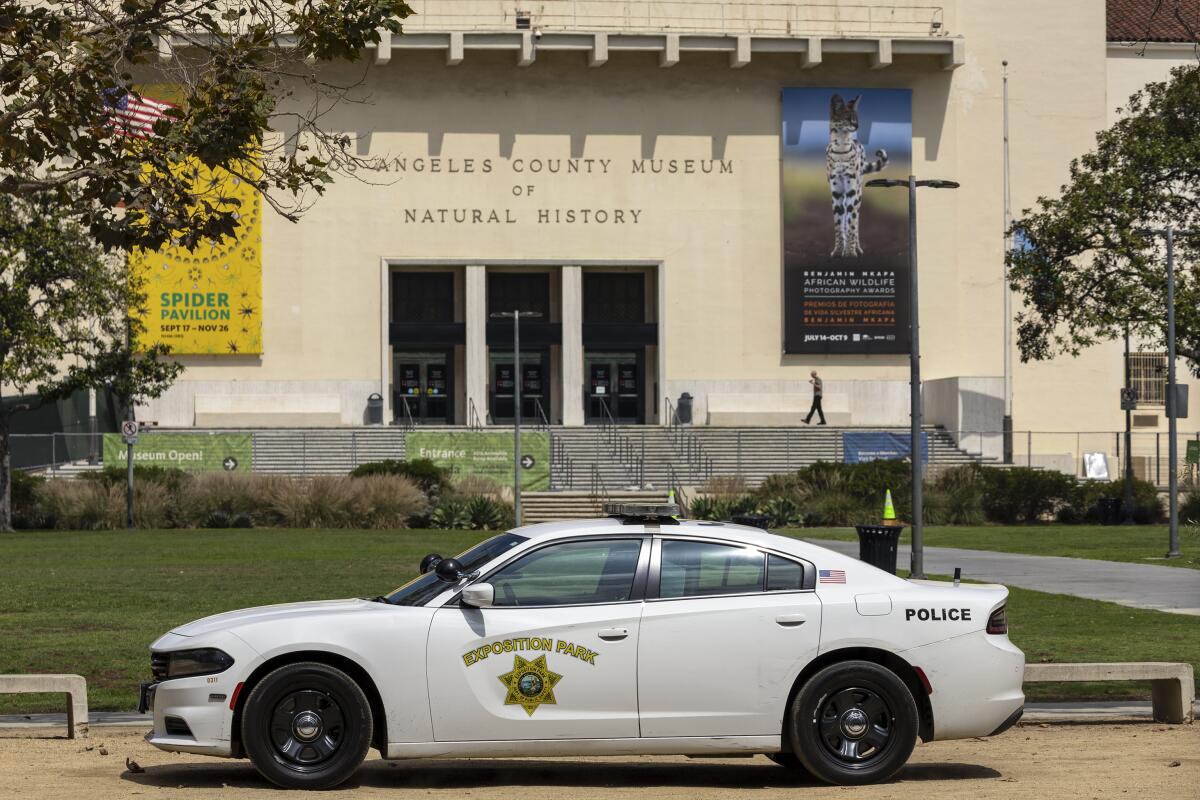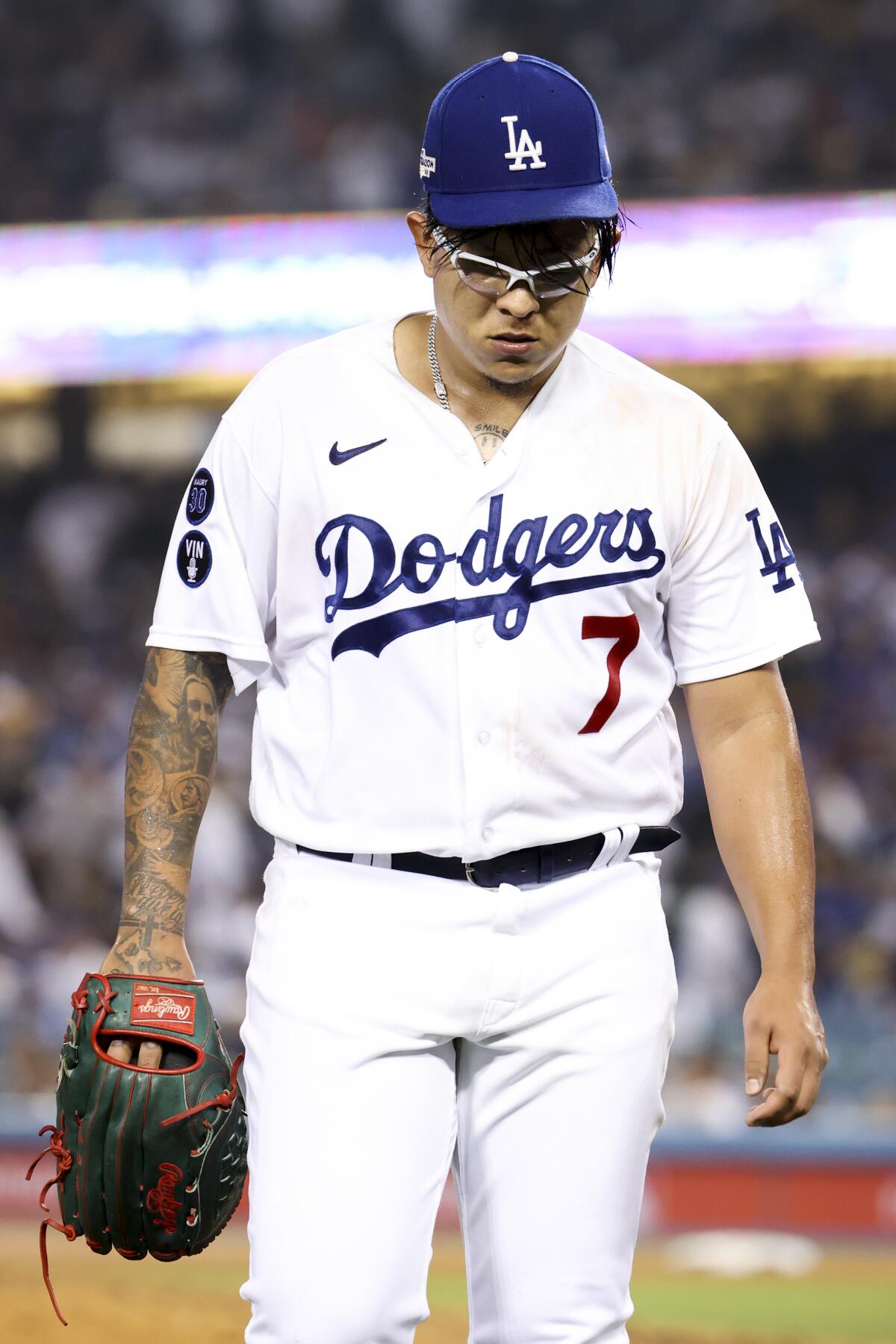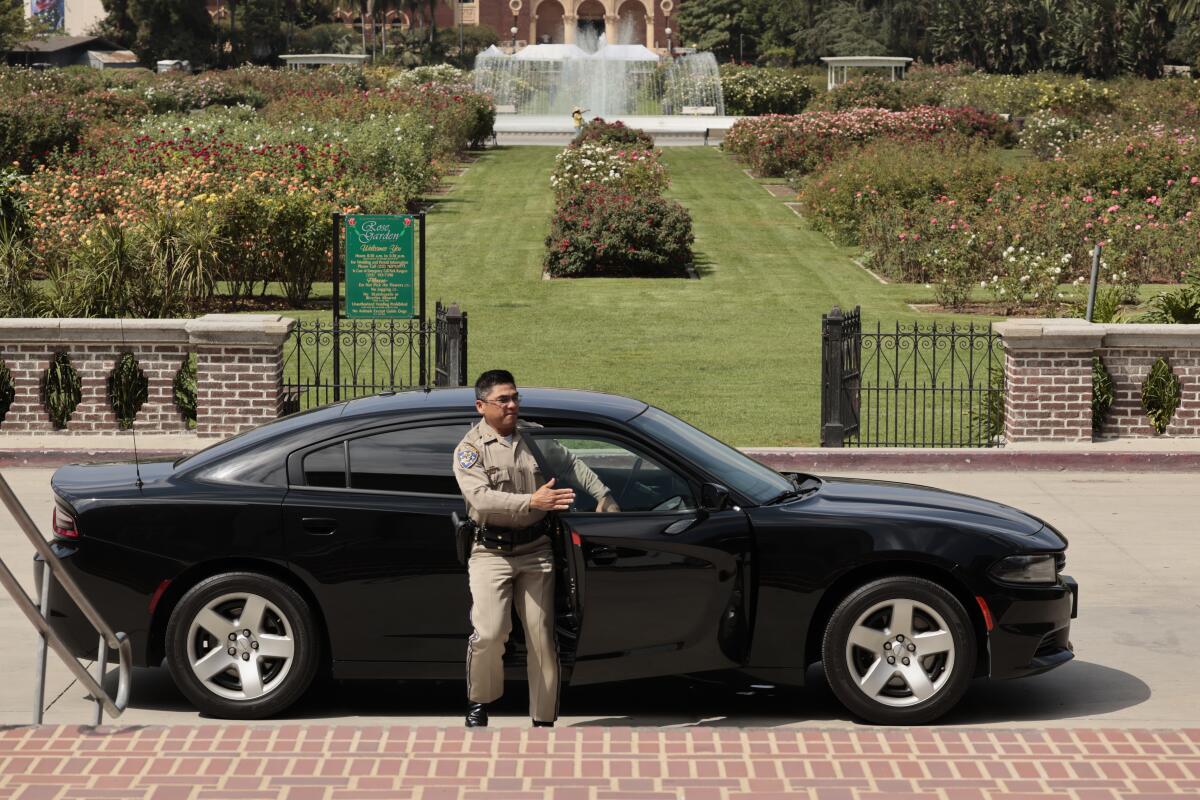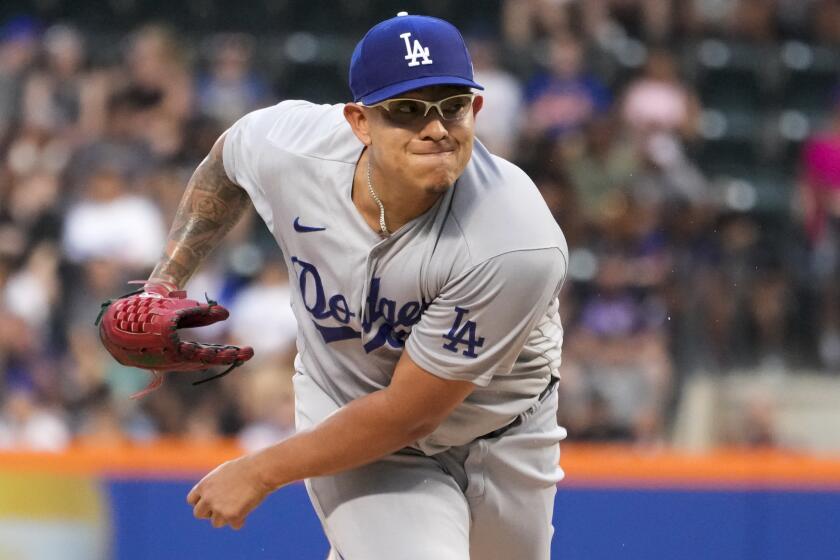Dodgers pitcher’s arrest puts spotlight on Exposition Park’s tiny police force

- Share via
When the news broke that Dodgers star pitcher Julio Urías had been arrested on suspicion of domestic violence, Angelenos might have been forgiven for not recognizing the agency that put the cuffs on him.
The Exposition Park Department of Public Safety?
Exposition Park, a 160-acre expanse of public space that includes museums, schools and ballparks in the heart of Los Angeles, is patrolled by its own police force, it turns out. The department’s headquarters are in the basement of a school, and most of its members are called “museum security officers.”
The arrest of Urías, who was taken into custody at 11 p.m. on Sept. 3 after leaving the LAFC soccer game against Lionel Messi’s Miami club, has thrown a spotlight on the small agency, which has struggled to respond to a flood of media inquiries and requests for information.

The Exposition Park Department of Public Safety is led by two California Highway Patrol officials, Capt. Mariano Santiago Jr. and Lt. Chris Carr, who act as chief and assistant chief, respectively.
In an interview in the chief’s office and subsequent tour of the park in a golf cart, Santiago and Carr explained that the Department of Public Safety is part of the Office of Exposition Park Management, which falls under the California Natural Resources Agency.
CHP officials, who are employed by the California Department of Transportation, began advising the park’s police force in 2007, posting a lieutenant at the park, before entering into a formal agreement in 2014, Santiago said. In addition to Santiago and Carr, three CHP sergeants and one officer are detailed to the park, an agency spokesman said.
The Department of Public Safety employs 14 officers and one supervisor. Members of the force were once all called “museum security officers,” and they were empowered to carry firearms, make arrests and use force as needed while on the job, Carr said.
After the California Legislature passed a bill in 2021 requiring all peace officers to graduate from a police academy and undergo various background checks, the Department of Public Safety sent four of its officers to six-month police academies to comply with the new law, Carr said.
Two have already graduated, two are currently enrolled and 10 more plan on completing the academy and background checks by the law’s January 2025 deadline for compliance, Santiago said.
Plus, we look back at the Dodgers-Braves series and break down what losing three out of four to Atlanta means.
Once certified, Department of Public Safety personnel will be known as “Exposition police officers” and have the power to arrest people while off-duty and carry concealed guns, much like officers employed by municipal or county law enforcement agencies, Carr said.
The area they patrol, home to some of the busiest arenas and largest music events in the city, is divided into a mosaic of police jurisdictions, depending on the day. The owners of the Coliseum and BMO Stadium have contracted the Los Angeles Police Department to provide security inside the ballparks on game days, Santiago said.
The park’s Department of Public Safety is responsible for patrolling outside stadium walls, including tailgating and vendor areas. USC’s Department of Public Safety also has jurisdiction within the Coliseum.

During music festivals — such as Hard Summer, which drew 75,000 people to Exposition Park a month ago — organizers contracted with the LAPD and CHP for security, Santiago said.
The Department of Public Safety has no dedicated investigators. When Darrell Caldwell, the rapper known as Drakeo the Ruler, was stabbed to death during the “Once Upon a Time in L.A.” music festival in 2021, detectives from the CHP’s Investigative Services Unit in South Los Angeles took the case, Carr said.
Carr said it was clear from the outset that Caldwell’s homicide would require “a very complex investigation.” No charges have been filed, he said, and the investigation remains open.
In Urías’ case, however, the Department of Public Safety officer who handcuffed the pitcher has remained the primary investigating officer. “Through his observations and on-scene information, he made the arrest,” Carr said.
A police report says a witness flagged down a Department of Public Safety officer after the soccer game between LAFC and Inter Miami and reported seeing a man attack a woman. The officer “determined a physical altercation” had occurred and arrested Urías, the report said.
The officer who arrested Urías hasn’t been identified.
Urías, 27, posted $50,000 bail less than three hours after his arrest, the report says. He has not been charged with any crime or commented publicly on his arrest. The Dodgers, meanwhile, have covered two large murals at Dodger Stadium that feature Urías and removed his locker from the clubhouse.
“It’s sad on every level,” Manager Dave Roberts told reporters.
Two detectives from the CHP’s Investigative Services Unit are helping the officer who arrested Urías with “extensive follow-up,” mostly locating and interviewing witnesses, Carr said. Considering how many people attended the soccer game preceding Urías’ arrest, there could be people who saw something earlier that night that may be relevant, Carr added.
Santiago acknowledged the Urías case is the highest-profile investigation the department has handled. They have no dedicated spokesperson to deal with the torrent of media inquiries they have fielded in the last week. Santiago said his officers are working to pull together as exhaustive an account as possible, knowing the findings will be scrutinized like no other case in the small department’s history.
“We want a concrete, complete investigation to justify everything,” he said. “If there’s insufficient evidence, we’re not going to charge anyone.”
More to Read
Sign up for Essential California
The most important California stories and recommendations in your inbox every morning.
You may occasionally receive promotional content from the Los Angeles Times.











